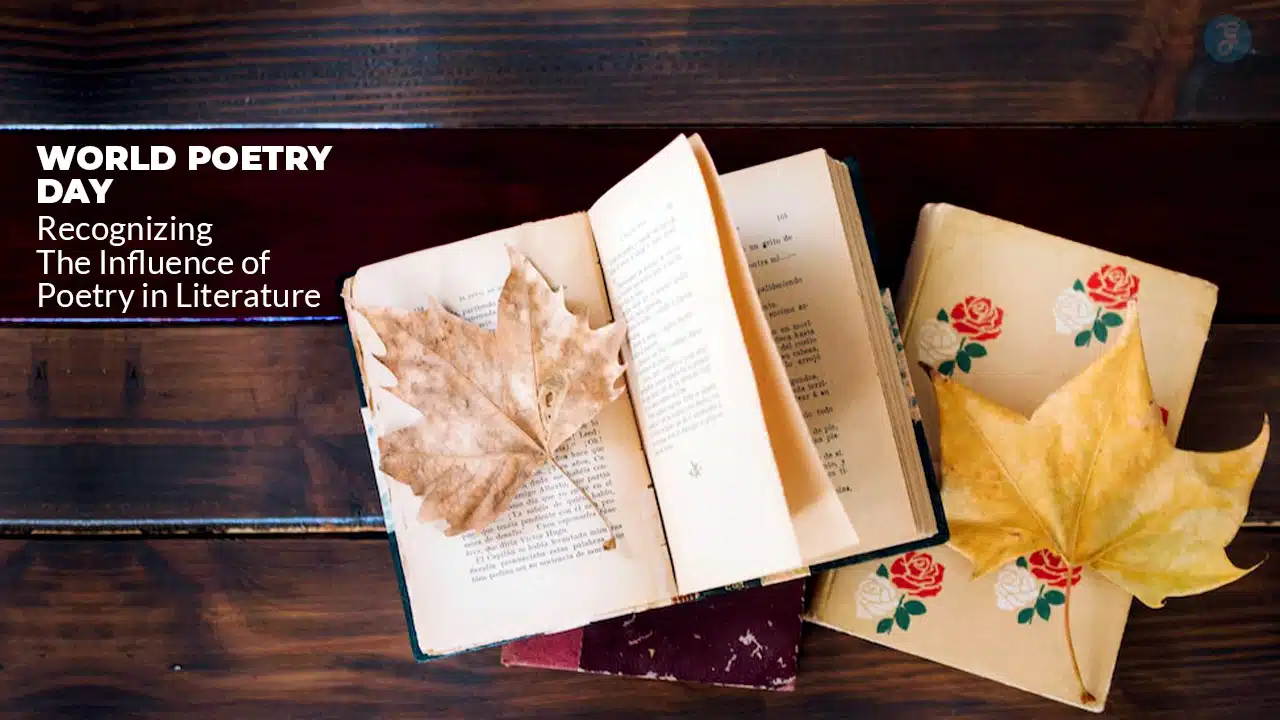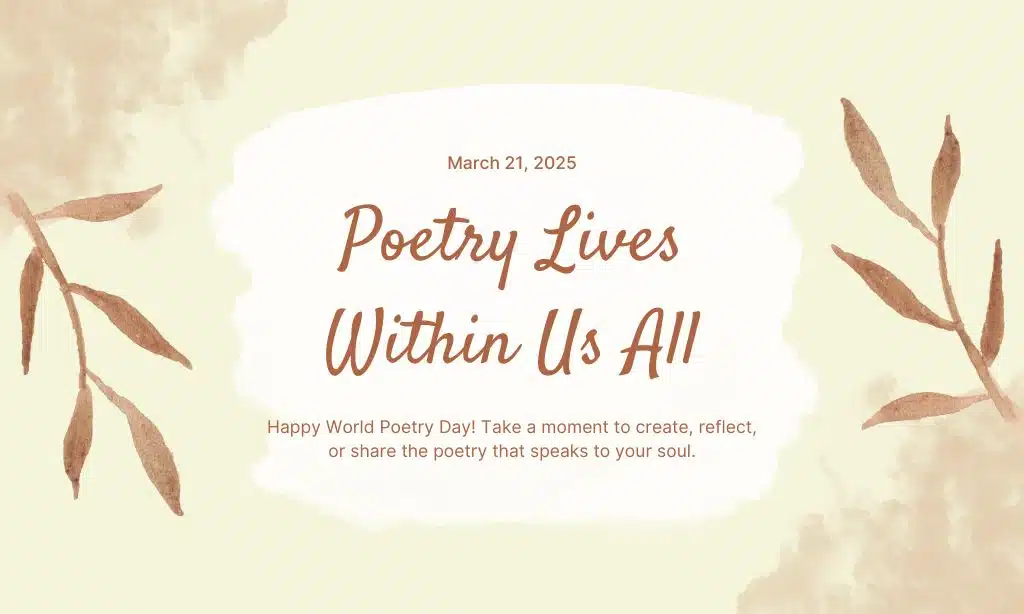Poetry can feel like a mystery to many people. Some think it’s outdated or too complex, while others aren’t sure how it fits into modern life. But poetry is everywhere—hidden in songs, stories, and even conversations.
Its power lies in painting emotions with words.
World Poetry Day, celebrated every March 21, shines a spotlight on this timeless art form. First established by UNESCO in 1999, this special day reminds us of poetry’s role in preserving culture and expressing shared values across the globe.
This blog will explore why poetry matters so much to literature and our lives today. From its ability to keep endangered languages alive to its way of igniting human connection—we’ll cover it all.
Keep reading; there’s more magic ahead!
Key Takeaways
- World Poetry Day is celebrated every year on March 21. It was established in 1999 by UNESCO to preserve cultural heritage and protect endangered languages through poetry.
- Poetry promotes linguistic diversity and keeps oral traditions alive. Events like readings, slams, and exhibitions honor voices from different cultures globally.
- Poets like Khalil Gibran, Salman Rushdie, and William Wordsworth show how poetry connects emotions with shared values across nations and time.
- Writing or reading poetry fosters empathy, creativity, and human connections while highlighting universal feelings like love, hope, or grief.
- This day encourages blending poetry with other arts like music or visual art to inspire new ways of expression worldwide.
Origins of World Poetry Day
World Poetry Day began with a global effort to honor poetry’s role in culture. Its creation highlights the need to cherish poetic traditions and languages at risk of vanishing.
UNESCO’s Proclamation in 1999
UNESCO declared World Poetry Day on March 21, 1999, during its 30th General Conference in Paris. This decision aimed to promote linguistic diversity and protect endangered languages through poetic expression.
The day also highlights oral traditions, encouraging their revival.
The proclamation emphasizes poetry’s role in human progress and meaningful dialogue. It invites the blending of poetry with other art forms like music or painting. By celebrating poets globally, UNESCO shows how writing poetry can preserve shared values across cultures.
Why March 21 Matters
March 21 celebrates the beauty of poetry worldwide. This date, chosen by UNESCO in 1999, highlights poetic expression’s power to preserve linguistic diversity and cultural identity.
It serves as a reminder to protect endangered languages and nurture oral traditions that risk fading away.
The timing aligns with the spring equinox—a season symbolizing renewal and creation. On this day, people honor poets who transform simple words into lasting art. The importance stretches beyond individuals; it connects global voices through shared values and emotions conveyed in verse.
Poetry’s Impact on Literature
Poetry shapes the way we communicate and think. It bridges cultures, voices, and emotions through words.
Celebrating Linguistic Variety
Linguistic diversity breathes life into poetry. World Poetry Day champions endangered languages, keeping them alive through poetic expression. It honors oral traditions that carry stories from one generation to the next.
Events like poetry readings and slams invite people to share their voices in native tongues, creating a rich tapestry of cultures.
Cities recognized by UNESCO Creative Cities of Literature spotlight multilingual works during this celebration. Poets craft in forms like haikus or sonnets, showcasing various linguistic styles.
These efforts highlight shared values while preserving cultural heritage for future generations.
Conveying Universal Human Emotions
Poetry paints feelings we all share, no matter where we live. Poems like the *Epic of Gilgamesh* prove emotions—love, loss, hope—stand the test of time. Through poetic expression, people connect deeply with shared values and stories.
Writing poetry lets individuals pour their hearts out while others find comfort in reading poetry that mirrors their own joys or struggles.
Blending words with rhythm and sound enhances this emotional power. National Poetry Month highlights how teaching poetry fosters empathy across cultures. Events like Struga Poetry Evenings celebrate heartfelt works from around the globe.
Such efforts remind us: emotions break barriers, even those between languages on UNESCO’s urgent safeguarding list of endangered languages.
Celebrating World Poetry Day
Celebrate creativity through the power of words. Embrace the joy of poetry with activities that inspire connection and expression.
Craft and Share Poems
Write a poem using your heart and mind. Poems can be free verse, haikus, or sonnets—each form is powerful. Share your poetic expression with friends or family to spark conversations.
Writing poetry connects you to universal human emotions like love, hope, or grief. Use it to honor endangered languages by crafting verses in regional tongues.
Post your poems online for World Poetry Day celebrations on March 21. Join communities that encourage reading poetry and writing together. Teaching poetry to children also keeps oral traditions alive while nurturing creativity in young minds.
Organize Poetry Slams and Readings
Poetry slams and readings breathe life into words. These events revive oral traditions, blending poetry with music, art, or performance. On March 21, people from many countries gather to share poetic expression in unique settings.
Students, teachers, and emerging poets often participate in these gatherings at schools or cultural spaces.
Spoken-word performances can spark dialogue about shared values or human emotions. Poetry reading celebrates linguistic diversity while honoring endangered languages through verse.
Hosting a slam engages voices of all ages and backgrounds. Keep the energy flowing by exploring exhibitions that highlight types of poetry next!
Explore Poetry Exhibitions and Events
Step into libraries, museums, or cultural centers hosting poetry exhibitions. Many cities hosting World Poetry Day celebrations display poetic expression through rare manuscripts, multimedia installations, and oral traditions.
UNESCO World Book Capital Cities often organize events to highlight endangered languages and linguistic diversity. These exhibitions connect visitors to the shared values embedded in global poetry.
Live performances also bring poems to life during this day. Some venues feature recordings of great poets like Blaže Koneski reading their works aloud. Schools might showcase student art inspired by lines of verse or host interactive sessions teaching poetry basics.
These gatherings celebrate both classic and modern voices in literature, creating spaces for learning and inspiration alike!
Inspirational Poetry Quotes
Poetry often carries wisdom tucked into its lines, sparking thoughts and emotions. Great poets use words to paint pictures, stir souls, and connect generations.
Insights from Salman Rushdie
Salman Rushdie praised poets for their bold voices. He believed they frame emotions that feel impossible to describe. Poets, he said, push boundaries and spark change by challenging norms.
Their words can create waves, inspiring action and stirring debates.
Rushdie’s view highlights poetry’s deeper role in society. Poems go beyond beauty; they carry shared values and awaken minds. With this power, poetry connects us across cultures and drives conversations that matter worldwide.
Wisdom from Khalil Gibran
Gibran wrote poetry as if painting feelings with words. He called it a mix of joy, pain, wonder, and language. His work showed how poetic expression captures life’s raw emotions in simple yet powerful ways.
His wisdom taught that reading poetry reveals shared values across people and cultures. It reminds us of the beauty in both spoken words and silent thoughts. By celebrating linguistic diversity through his art, Gibran helped preserve oral traditions tied to endangered languages.
Reflections by William Wordsworth
William Wordsworth called poetry “the spontaneous overflow of powerful feelings.” He highlighted how poetry connects deeply with human emotions. His work celebrated the bond between nature and life, inviting readers to feel rather than just think.
Wordsworth believed poetic expression should stay genuine. Through his writings, he showed that simple language could carry profound meaning. His reflections shaped modern literature’s love for raw emotion and authenticity in reading poetry or teaching poetry globally.
Takeaways
Poetry connects people through words, emotions, and ideas. It celebrates diversity while giving a voice to endangered languages. Writing or reading poetry can bring joy and insight into our lives.
March 21 reminds us of its value in literature and human culture. Why not read a poem today or write your own? Let poetry inspire you to see the world differently!
FAQs on World Poetry Day
1. What is World Poetry Day, and why is it celebrated?
World Poetry Day honors poetic expression and its role in literature. It highlights the importance of reading poetry, writing poetry, and preserving oral traditions.
2. How does World Poetry Day support endangered languages?
The day promotes linguistic diversity by encouraging the use of endangered languages in poetry, keeping them alive through creative works.
3. How can teaching poetry benefit students?
Teaching poetry helps students connect with shared values, explore language creatively, and understand cultural histories through poetic forms like oral traditions.
4. Are there other events similar to World Poetry Day?
Yes! National Poetry Day and National Poetry Month also celebrate the art of poetry with activities like poetry readings and workshops.
5. What is the Golden Wreath Award?
The Golden Wreath Award honors poets whose work has had a lasting influence on literature worldwide, emphasizing their contributions to poetic expression.








































